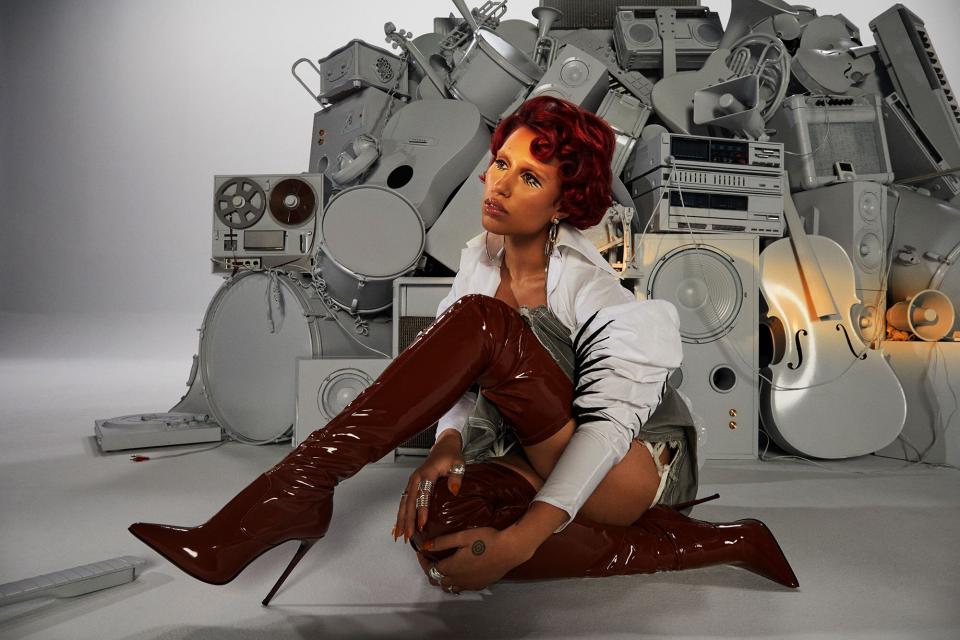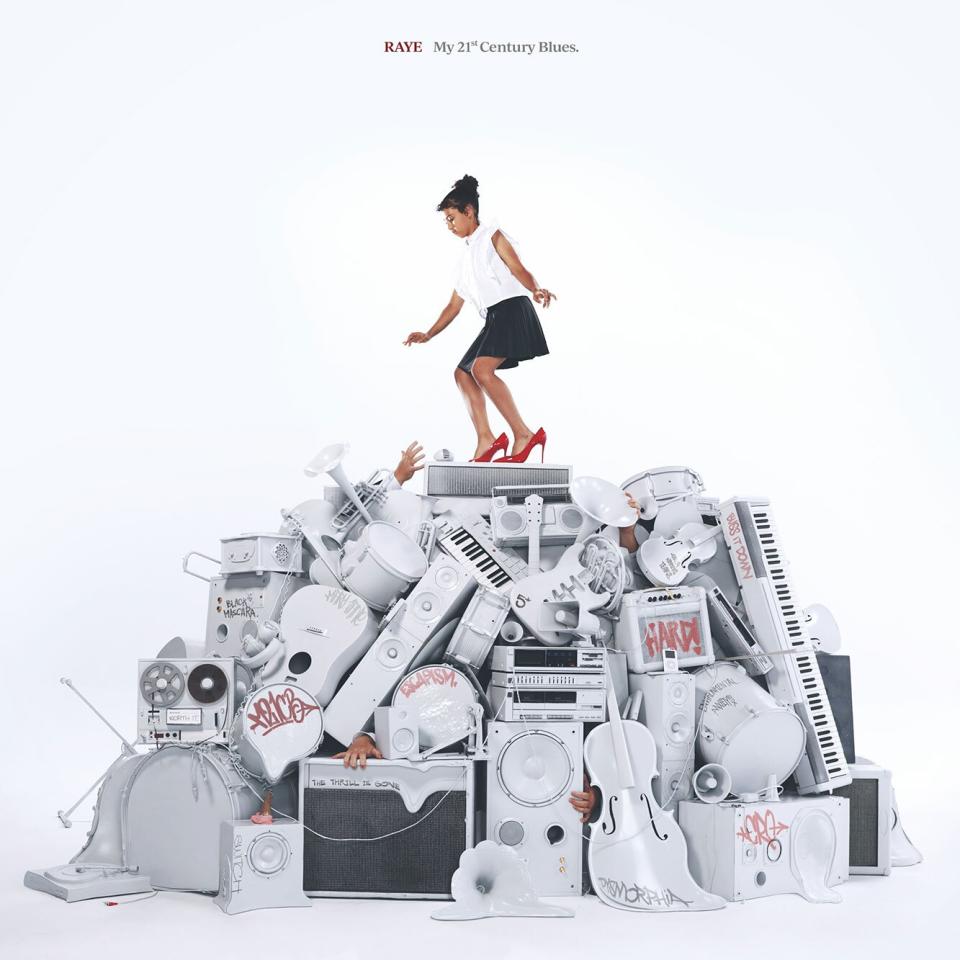Raye reintroduces herself with her long-awaited debut album My 21st Century Blues
Allow Raye to re-introduce herself.
British singer-songwriter Raye is no stranger to the music industry. Discovered for her ability as a songwriter during her teen years, she has been writing for the likes of Rihanna, Little Mix, and Beyoncé, and releasing hits including "Decline," "Secrets," and "Bed" since 2017. Now, after breaking ties with her label and becoming an independent artist, Raye is finally releasing her debut album, My 21st Century Blues (out now). "It just feels amazing to have reached this milestone finally," she tells EW about releasing a full body of work.
The South London native started taking control of her career in 2021, when she boldly shared online her frustrations with her label. After coming forward early that year about how her label wouldn't allow her to release an album, Raye announced she was parting ways with them that summer. "It took me quite a while to announce the album and figure out exactly what I wanted to do. I had to do a bit of soul searching and remember my intentions as an artist from when I was a young girl before I put pen to paper on a record deal," she explains.
With full control, the 25-year-old artist gets to reintroduce herself on her own terms. "The music, in some respects, is worlds away from anything that I've shared before and some of it has a little similarity in places," she says about what longtime fans can expect. Raye says the freedom she's felt has resulted in a deep and raw album that delves into her own experience in the industry, and in life. The powerful collection of tracks will have you singing along at times, dancing at others — and will often get you in your feels. With her storytelling covering everything from misogyny to sexual abuse and much more, My 21st Century Blues mines the artist's life using her lyrical precision and seasoned pen to bring her stories to life through music.
Her intentional artistic vision extends past the lyrics to the visuals, which we see in the videos for tracks including "Black Mascara" and "Escapism." "It's been really important that the visuals are loud and an honest reflection of what the songs are about and work hand in hand from my perspective of the lyricism," she explains. Alongside the striking choreography of the gentleman's club-set "Black Mascara" video, things go blurry after Raye has a drink. "It's a depiction of overcoming and healing whilst in pain," she says, "I want it to be subtle, but intentional with the story behind the song."
While she calls the "Escapism" music video one of her "proudest visuals," she'll be delivering powerful imagery for the very personal track "Ice Cream Man," which Raye directed herself. Calling it the "toughest shoot" she's ever done, Raye was encouraged by the all-women crew when working on the empowering anthem about an assault. She sought advice about the visuals from a friend, beloved storyteller Michaela Coel, who played a big part in convincing Raye to direct. "I really thank her for giving me that encouragement because I don't know if I would have done it without that," she shares. "It's going to be interesting putting it out there, but I'm glad I was brave enough to get it done."
Below, Raye tells EW about her artistic influences for My 21st Century Blues, from trusted creatives to old-school music.

Callum Walker Hutchinson British singer-songwriter Raye
Jazz
"Jazz music is my most consumed genre. I find so much peace and joy in [it]," she says. Having spent her career making music in other genres, it became a refuge for her as a fan — and as someone who appreciates the freedom jazz artists have in expressing themselves. "There's just no rules and it can bend or move anywhere, but at the same time when you have a slower number it's so emotive, powerful, beautiful, romantic, and/or painful," she explains. You can hear her inspiration at work in her soaring vocals on tracks "Oscar Winning Tears" and "Mary Jane."
The magic of collaborating with friends
For My 21st Century Blues, Raye teamed up with her good friend Mike Sabath to executive produce the album. "We work really well together because there's never any rules or restrictions on what we create," she says about their partnership. The result of that teamwork can be heard in many tracks, including Raye's latest release "Escapism." Raye had the name and a story she wanted to tell, and Sabath paired it with the perfect beat. "If I were to take it down to a piano it would be a really sad song, but I wanted something that made it feel the opposite, kind of lifted," she explains of his addition, which injects power and euphoria into the painful story — exactly what she was looking for.
Nina Simone
In an effort to focus on what she was drawn to naturally, Raye didn't listen to current music, instead immersing herself in the classics that influenced her early on — artists including Nina Simone, Etta James, B.B. King, and a lot of jazz music. "I wanted to take space from pop culture and what was going on to see what I wanted to draw from without being too heavily influenced by anything that's going on today," she says of her approach to My 21st Century Blues. Raye, who names Simone, Alicia Keys, and Jill Scott among her influences, recalls staring at a poster of Simone with the quote "An artist's duty is to reflect the times" on the day she went public on Twitter about her frustrations with her former label.

Human Re Sources
Music production of the past
Autotune and other modern music production tools are staples today, but Raye opted for techniques of the past for her new record. "Two of the songs on the album [were] recorded analog to tape with all live instruments. It was one of the most beautiful experiences, getting a little taste of how music was captured back in the day," she shares. Letting go of effects and modern tools, Raye is able to deliver the raw vocals you hear on tracks like "Mary Jane" and "The Thrill Is Gone." "Back then the purity of the lyricism came through the pain and emotions in the vocals just in a single take. I find it so moving," she says of her own inspirations, including Aretha Franklin.
With "The Thrill Is Gone," one of six tracks Raye co-produced, she incorporated more classic methods of making music. "I knew that I wanted to take it all live," she says about recording the track at famed Valentine Recording Studio in Los Angeles, "I was in the room with the brass and strings, composing the parts kind of on the spot." The creativity in the room and the collaboration of the talented musicians resulted in a track that fans have been loving since its release.
Gospel music
"I grew up in church and gospel music is a big part of my childhood, my musicality, my taste, and stuff," she says of how her upbringing takes shape on the track "Buss It Down." While recalling the "really lovely and fun" experience of making the song in a room full of women, Raye shares that she decided to add a choir to the chorus because it was missing something. Creating a juxtaposition, the song became an empowering song about single people living freely until they find the one.
The honesty of lyricism
Raye started writing songs when she was 16, finding storytelling as a way of getting to her own personal truth. "Jill Scott does [it] so effortlessly. When I was listening to her album as a kid, I was so blown away by the way she felt like she was just speaking to me, like she was having a conversation," she explains. Raye found her own unique way to emulate what she loves about Scott's approach, using her own unfiltered voice as a key element, similar to calling a friend to tell them about something that's happened to you. As a songwriter, Raye has written tracks that range from R&B to dance-pop, successfully maintaining that honesty while learning more about music production. Whether it's the smooth rhymes she heard in Scott's music or the more mathematical approach to dance music of the Swedish writers and producers she's worked with, Raye has found inspiration across genres to infuse into the core of her artistry.
My 21 Century Blues is out now.
Related content:

 Yahoo Sports
Yahoo Sports 